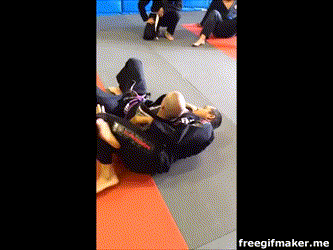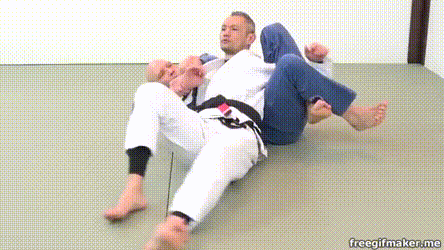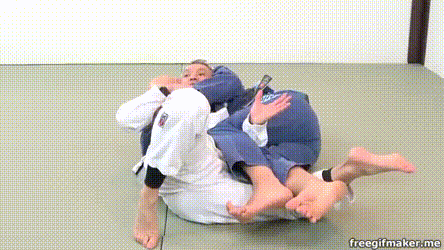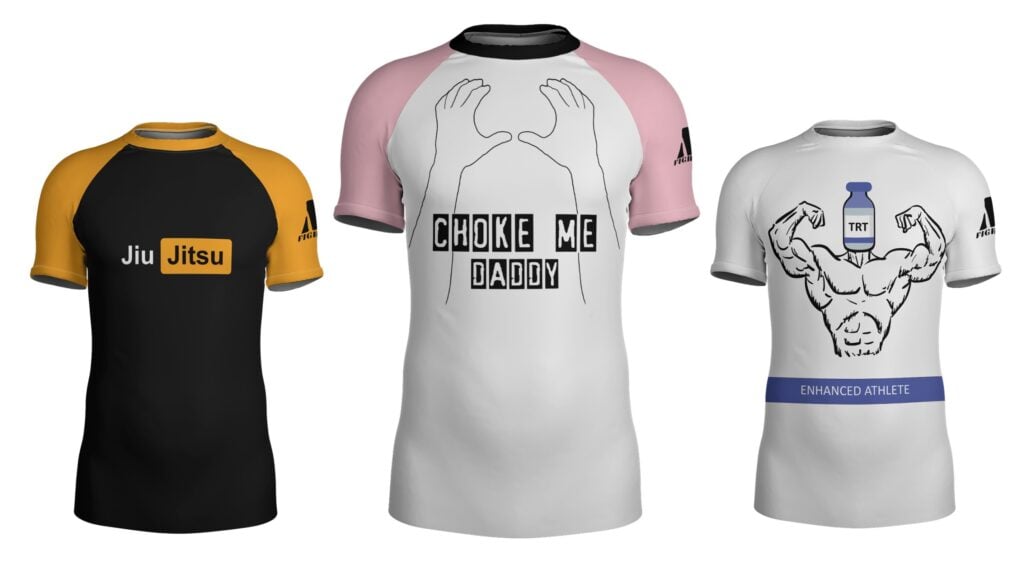
If you asked me which position in really deeply hate defending against I’d have to say it was back control. Having someone behind you makes finding ways out that more difficult. Even leg locks are easier to deal with than having a human backpack trying to strangle you from behind. To this day, I do not particularly enjoy getting out of back control, so I try to prevent it the best I can. That said, there’s one back control variation that I’d bet most grapplers utterly hate. At least when they’re on the receiving end. Back control defense is not easy, and crucifix defense is even harder. In fact, getting out of the crucifix position might be the greatest Houdini act in Jiu-Jitsu! Now, it’s time for you to learn how to perform it!
If you take a look at some of the world’s most proficient grapplers, you’ll easily notice a common pattern. Marcelo Garcia, Felipe Pena, Cobrinha etc, all have the tendency to hunt for the back. Back control does bring an immense amount of control along with direct submission options. In fact, it also brings 4 points in most competition formats, which is the most you can get from a single position. Escaping is hard, even when you’re in the basic seatbelt and hooks control. Crucifix defense is a whole different can of worms, but it is absolutely necessary for you to know at least one.
Why should you be so focused on learning a crucifix defense? Well, first of all, the crucifix position is like back control on steroids. Secondly, even more, submissions and even striking options are readily available. And last but not least, even though your hips are free, getting out is nearly impossible against a well-versed opponent. So, figuring ways out of a position that has you trapped, powerless and gives your opponent multiple ways to finish you is not just a good idea, it is a priority!
The Power Of The Crucifix
The crucifix position is one of the most brutal positions in Brazilian Jiu-Jitsu. In fact, it is one of the most notorious positions in all of grappling martial arts and even MMA. The main problem with the crucifix position is the incredible amount of control over your upper body. Even though it may seem your opponent is barely hanging on, there’s absolutely no way to free your hands. Unless you create one, of course.
The crucifix position has you behind an opponent, controlling one arm with a Kimura grip, and the other with a triangle made with your legs. The power of the position lies in the fact that it offers control over both shoulders. The reason why control is so tight is that there’s no way to either pull or rotate your arms out. In fact, you’ll hardly even be able to bend or extend them unless the opponent allows it.
Getting there is also not hard at all. Feeling comfortable defending chokes from the back? Well, once you get caught in the crucifix a few times you’ll reconsider how comfortable you are. Getting there fro regular back control is a breeze. there are also very nasty ways of entering the crucifix from the turtle or the front headlock. In both cases, there are even more options for submission.
Speaking of submissions, name your favorite. the only thing missing are leg locks, and they’re actually not that far away. Arm locks and chokes are the usuals but there are also nasty neck cranks and ultra painful wrist locks. Now it is clear why you need a crucifix defense if you’re to become a good grappler.
High-Level Crucifix Defense Principles
Before we begin discussing crucifix defense, let’s make something clear. You can fight against the position until a certain point. Once you’re past the point of no return, you’ll get submitted, This is crucial to understand in order for you to know when you should tap. The crucifix defense options we’ll explore today work against the position, not fully locked submissions.
Learn some crucifix setups, attacks, and even defenses, from a true master of the position. Alexandre Vieira’s “Crucifix And Loop Chokes” DVD set is a unique piece of digital instructions. Get it while it is still on sale!
An Ounce Of Prevention
In order to stay safe, you need to understand that the weak spot of the crucifix is only during its establishment. Since in most cases, people are going to have control over one arm. preventing them from getting the other is essential.


Last Gasp Crucifix Defense
This crucifix defense is as last second as it can be. it utilizes the fact that your opponent releases one of your arms in order to get to your neck. At this point, an experienced opponent is already very near a choke so you’ll need to act really quick.




![Darce Choke Encyclopedia – Origins, Mechanics and Variations [2025] BJJ, choke, Brabo, BJJ Darce Choke, D'arce Choke, Darce BJJ Choke](https://bjj-world.com/wp-content/uploads/2017/11/JungPoirierLeeYahoo-218x150.jpg)











![Slicin’ Calves Mikey Musumeci DVD Review [2025] Slicin' Calves Mikey Musumeci DVD Review](https://bjj-world.com/wp-content/uploads/2025/04/slicin-calves-mikey-musumeci-dvd-review-218x150.png)
![Jiu-Jitsu For Old Guys Guard Retention Bernardo Faria DVD Review [2025] Jiu-Jitsu For Old Guys Guard Retention Bernardo Faria DVD Review](https://bjj-world.com/wp-content/uploads/2025/03/old-guys-guard-retention-bernardo-faria-dvd-review-218x150.png)
![X-Guard Trickery Kyle Sleeman DVD Review [2025] X-Guard Trickery Kyle Sleeman DVD Review](https://bjj-world.com/wp-content/uploads/2025/03/x-guard-trickery-kyle-sleeman-dvd-review-218x150.png)
![Countering with Crab Ride Anthony Budion DVD Review [2025] Countering with Crab Ride Anthony Budion DVD Review](https://bjj-world.com/wp-content/uploads/2025/03/countering-with-crab-ride-anthony-budion-dvd-review-218x150.png)
![Crush The Guard Vagner Rocha DVD Review [2024] Crush The Guard Vagner Rocha DVD Review](https://bjj-world.com/wp-content/uploads/2024/10/crush-the-guard-vagner-rocha-dvd-review-324x235.png)
![Reverse Armlock Magid Hage DVD Review [2024] Reverse Armlock Magid Hage DVD Review](https://bjj-world.com/wp-content/uploads/2024/12/reverse-armlock-magid-hage-dvd-review-100x70.png)
![Spider and Lasso Guard Jared Welman DVD Review [2025] Spider and Lasso Guard Jared Welman DVD Review](https://bjj-world.com/wp-content/uploads/2025/01/spider-and-lasso-guard-jared-welman-dvd-review-100x70.png)
![EMU Guard 2.0 Benjamin Power DVD Review [2024] EMU Guard 2.0 Benjamin Power DVD Review](https://bjj-world.com/wp-content/uploads/2024/11/emu-guard-2-0-benjamin-power-dvd-review-100x70.png)
![Darragh O’Conaill Crucifix Encyclopedia DVD Review [2024] Darragh O'Conaill Crucifix Encyclopedia DVD Review](https://bjj-world.com/wp-content/uploads/2024/10/darragh-oconaill-crucifix-encyclopedia-dvd-review-100x70.png)

![Advanced Immortal Clinch Matt Brown DVD Review [2024] Advanced Immortal Clinch Matt Brown DVD Review](https://bjj-world.com/wp-content/uploads/2024/09/advanced-immortal-clinch-matt-brown-dvd-review-100x70.png)


![Leg Locks From Beginner To Advanced Dan Manasoiu DVD Review [2024] Leg Locks From Beginner To Advanced Dan Manasoiu DVD Review](https://bjj-world.com/wp-content/uploads/2024/12/leg-locks-from-beginner-to-advanced-dan-manasoiu-dvd-review-100x70.png)
![Creating Back Exposure Luke Griffith DVD Review [2025] Creating Back Exposure Luke Griffith DVD Review](https://bjj-world.com/wp-content/uploads/2025/01/creating-back-exposure-luke-griffith-dvd-review-100x70.png)
![Efficiently Executing X-Guard Giancarlo Bodoni DVD Review [2024] Efficiently Executing X-Guard Giancarlo Bodoni DVD Review](https://bjj-world.com/wp-content/uploads/2024/09/efficiently-executing-x-guard-giancarlo-bodoni-dvd-REVIEW-100x70.png)
![The Bear Trap Nicolas Renier DVD Review [2025] The Bear Trap Nicolas Renier DVD Review](https://bjj-world.com/wp-content/uploads/2025/01/the-bear-trap-nicolas-renier-dvd-review-100x70.png)
![Dubious De La Riva Dominique Bell DVD Review [2024] Dubious De La Riva Dominique Bell DVD Review](https://bjj-world.com/wp-content/uploads/2024/10/dubious-de-la-riva-dominique-bell-dvd-review-100x70.png)
![Slip N Slide Into Victory Julián Espinosa DVD Review [2025] Slip N Slide Into Victory Julián Espinosa DVD Review](https://bjj-world.com/wp-content/uploads/2025/01/slip-n-slide-into-victory-julian-espinosa-dvd-review-100x70.png)


![Slicin’ Calves Mikey Musumeci DVD Review [2025] Slicin' Calves Mikey Musumeci DVD Review](https://bjj-world.com/wp-content/uploads/2025/04/slicin-calves-mikey-musumeci-dvd-review-100x70.png)
![A Blueprint For Smeshing Khabib Nurmagomedov DVD Review [2024] A Blueprint For Smeshing Khabib Nurmagomedov DVD Review](https://bjj-world.com/wp-content/uploads/2024/10/blueprint-for-smeshing-khabib-nurmagomedov-dvd-review-100x70.png)
![Dima Murovanni Kill The Collar Tie BJJ Trendsetters DVD Review [2024] Dima Murovanni Kill The Collar Tie BJJ Trendsetters DVD Review](https://bjj-world.com/wp-content/uploads/2024/09/dima-murovanni-kill-the-collar-tie-dvd-review-100x70.png)

![Front Head Lock Kaynan Duarte DVD Review [2025] Front Head Lock Kaynan Duarte DVD Review](https://bjj-world.com/wp-content/uploads/2025/02/front-head-lock-kaynan-duarte-dvd-review-100x70.png)
![Tiny Woman Guide To The Guard Ann Kneib DVD Review [2024] Tiny Woman Guide To The Guard Ann Kneib DVD Review](https://bjj-world.com/wp-content/uploads/2024/11/tiny-woman-guide-to-the-guard-ann-kneib-dvd-review-100x70.png)

![10th Planet Leg Locks Jeremiah Vance DVD Review [2025] 10th Planet Leg Locks Jeremiah Vance DVD Review](https://bjj-world.com/wp-content/uploads/2025/01/10th-planet-leg-locks-jeremiah-vance-dvd-review-100x70.png)

![Mastering The Crucifix Alexandre Pereira DVD Review [2025] Mastering The Crucifix Alexandre Pereira DVD Review](https://bjj-world.com/wp-content/uploads/2025/01/mastering-the-crucifix-alexandre-pereira-dvd-review-100x70.png)

![Roger Gracie Closed Guard System DVD Review [2025] Roger Gracie Closed Guard System DVD Review](https://bjj-world.com/wp-content/uploads/2025/01/roger-gracie-closed-guard-system-dvd-review-100x70.png)